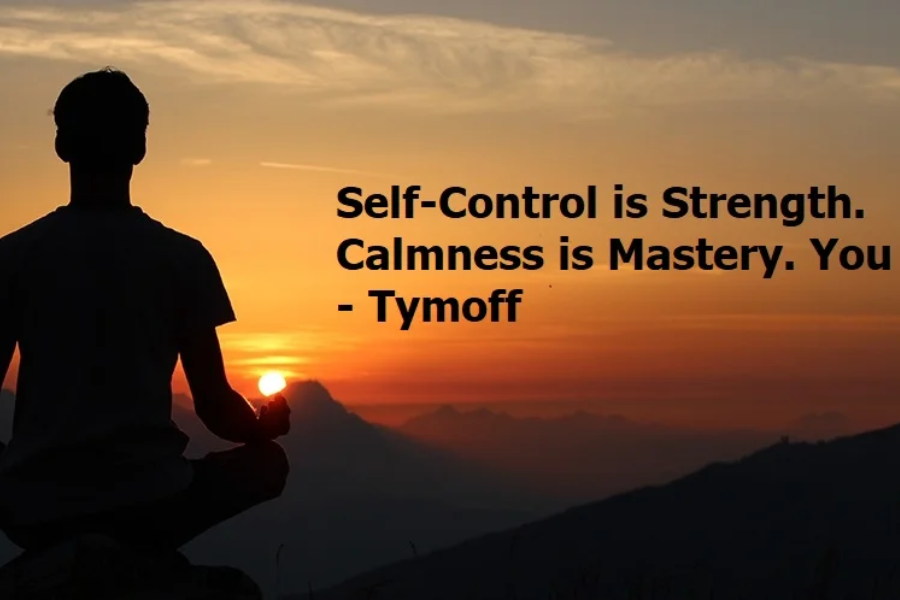Self-Control Is Strength. Calmness Is Mastery. You – Tymoff
In the complex tapestry of human experience, the principles of self-control and calmness stand out as pillars of true strength and mastery. Tymoff, a figure whose wisdom transcends time, encapsulates this truth in the powerful statement: “Self-Control Is Strength. Calmness Is Mastery. You – Tymoff.” This profound insight delves into the essence of personal power and the art of gracefully navigating life’s challenges. Let’s explore these concepts in depth.
Self-Control: The Pillar of Strength
At the heart of Tymoff’s wisdom lies the understanding that self-control is more than just a trait—it’s a formidable source of strength. In a world inundated with distractions and challenges, the ability to manage one’s emotions and actions becomes an invaluable asset. Self-control is not merely about resisting temptation; it’s about mastering one’s inner world to achieve a state of equilibrium and resilience.
Self-control manifests in various aspects of life. It involves resisting immediate gratification, regulating emotional responses during crises, and making deliberate choices that align with long-term goals. In essence, it’s the capacity to control one’s impulses, thoughts, and emotions, thus fostering discipline and fortitude. Tymoff encourages us to recognize that real power lies in mastering oneself rather than relying on external force.
Calmness: The Brushstroke of Mastery
In Tymoff’s philosophical framework, calmness complements self-control as a crucial element of mastery. If self-control is the foundation, calmness is the art that adorns it. Amidst the chaos of modern life, the ability to remain serene is a testament to one’s mastery over self and circumstance. Calmness is not about passive resignation but an active, steadfast approach to managing life’s inevitable storms.
Mastery of calmness involves handling a flood of emotions, thoughts, and external pressures with grace and composure. It is an inner sanctuary that remains unaffected by the turbulence around us. Tymoff suggests that cultivating tranquility allows individuals to exert a profound influence over their emotional states, thereby affecting their interactions with the world.
The Symbiosis of Self-Control and Calmness
Tymoff’s philosophy underscores the interconnectedness of self-control and calmness. These qualities are not standalone attributes but rather interrelated aspects of a harmonious life. Self-control lays the groundwork for calmness, while tranquility reinforces the power derived from self-discipline.
Consider a scenario where a rapid response is required. Without self-control, the initial reaction might be impulsive and potentially detrimental. However, with self-control, one can pause, reflect, and respond thoughtfully. This deliberate restraint paves the way for calmness, transforming a potentially chaotic situation into an opportunity for mastery.
Furthermore, this synergy extends beyond personal well-being. In interpersonal dynamics, individuals who embody self-control and calmness become sources of strength and stability for others. Their presence fosters a positive emotional environment, promoting growth and understanding within their circles.
“You – Tymoff”: The Empowerment of Individual Agency
The closing phrase of Tymoff’s remark, “You – Tymoff,” highlights the significance of personal agency and empowerment. It emphasizes that the journey toward self-control, calmness, and mastery is uniquely personal. Each individual is the author of their own story, shaping their destiny through their actions and choices.
This aspect of Tymoff’s wisdom reminds us that self-mastery is not about replicating others’ paths but about discovering and embracing our authentic selves. Tymoff, as a symbol of knowledge, encourages everyone to chart their course, recognizing that true power and mastery are expressions of individual resilience and insight.
Practical Application in Everyday Life
Understanding Tymoff’s philosophy extends beyond theoretical reflection; it calls for practical application in daily life. Integrating self-control and calmness requires intentional practice and consistent effort. Here are some actionable steps to embody these virtues:
Pause Before Reacting: When faced with a challenge, practice the habit of pausing before responding. Take time to evaluate the situation and choose a response that aligns with your values and long-term goals.
Embrace Mindfulness: Techniques such as deep breathing, meditation, and mindfulness can help regulate emotions and maintain composure. These practices enhance your ability to handle stress and navigate life’s demands with calmness.
Adaptability and Flexibility: Life is dynamic and ever-changing. Embrace change with an open mind, allowing yourself to adapt with serenity and resilience.
Continuous Self-Mastery: Recognize that self-control is an ongoing process. Be patient with yourself, understanding that progress involves setbacks and learning.
The Art of Response, Not Reaction
Tymoff’s guidance advocates for the art of conscious response rather than impulsive reaction. Self-control enables us to choose how we respond to various stimuli, rather than being driven by automatic reactions. This shift from reaction to response represents genuine strength, reflecting a thoughtful and empowered engagement with life’s challenges.
Resilience in the Face of Adversity
The combination of self-control and calmness fosters resilience, equipping individuals to withstand difficulties with steadfast determination. Life’s trials are inevitable, but those who embody these qualities can maintain their composure amid adversity. Tymoff’s philosophy highlights that the strength derived from self-control and the mastery inherent in calmness create a robust spirit capable of managing life’s ups and downs.
Influence on Decision-Making
Self-control and calmness significantly impact decision-making. These attributes enhance one’s ability to make sound judgments, free from the distortions of impulsive emotions or external pressures. Decisions made with clarity and tranquility are more likely to align with long-term objectives, providing a sense of control over one’s life trajectory.
Fostering Healthy Relationships
Beyond individual benefits, Tymoff’s perspective underscores the role of self-control and calmness in cultivating healthy relationships. Effective interpersonal interactions require patience, empathy, and understanding. Individuals who exemplify these qualities contribute to a communicative, respectful, and harmonious relationship environment.
In real life, whether it’s achieving goals or enhancing personal development, self-control is foundational. Like any skill, self-control can be honed through practice. Techniques such as setting achievable goals and designing motivational tools can help reinforce this discipline.
Conclusion
Tymoff’s quote, “Self-Control Is Strength. Calmness Is Mastery. You – Tymoff,” captures the essence of personal empowerment through self-discipline and tranquility. Embracing these virtues opens the door to a transformative journey of self-discovery, resilience, and authenticity. By internalizing and applying Tymoff’s timeless wisdom, individuals can navigate life’s challenges with strength and grace, contributing to a more harmonious and resilient world.
Find the most recent headlines and features at LatestFeedBuzzard.com.






